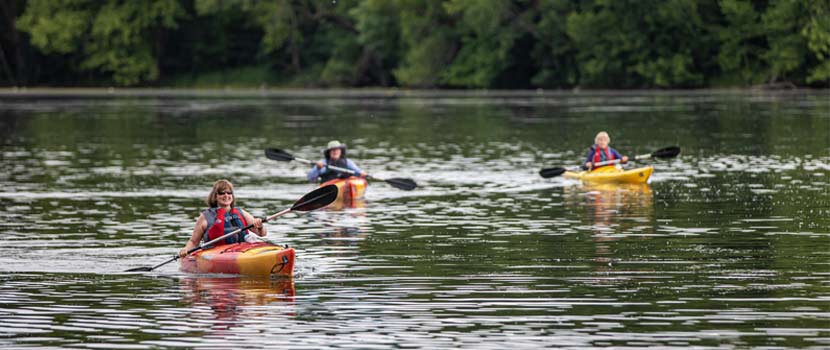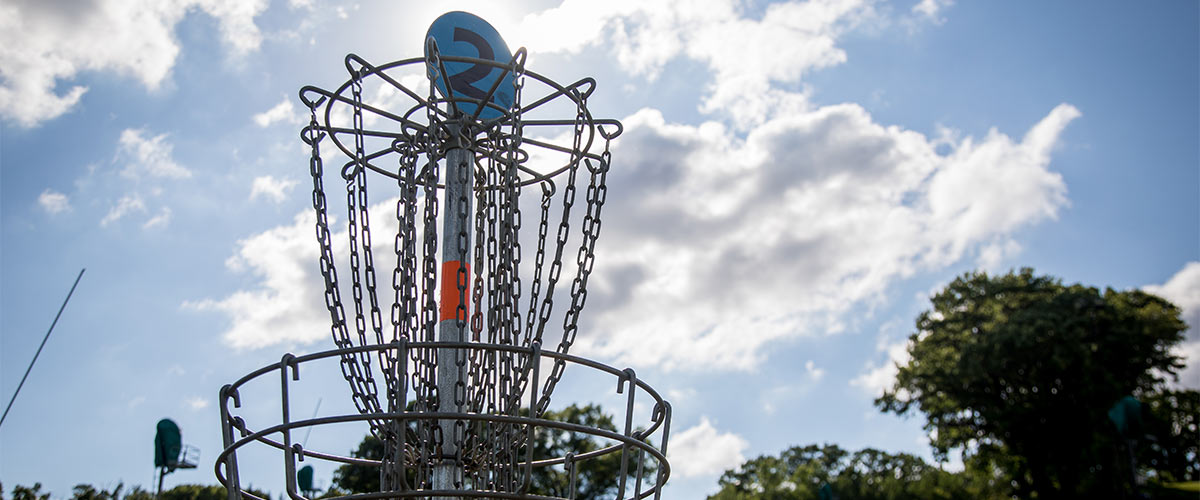
Looking for a fun, inexpensive activity to get yourself and those close to you outside and moving? If so, disc golf may be the game for you!
Disc golf is a lot like golf in that you are outdoors enjoying beautiful courses and getting good exercise, but it’s a lot less costly. What could be better? And it’s an activity anyone can do, though patience and perseverance are helpful qualities to have. All you need is a good pair of walking shoes, a disc and a disc golf course.
What is Disc Golf?
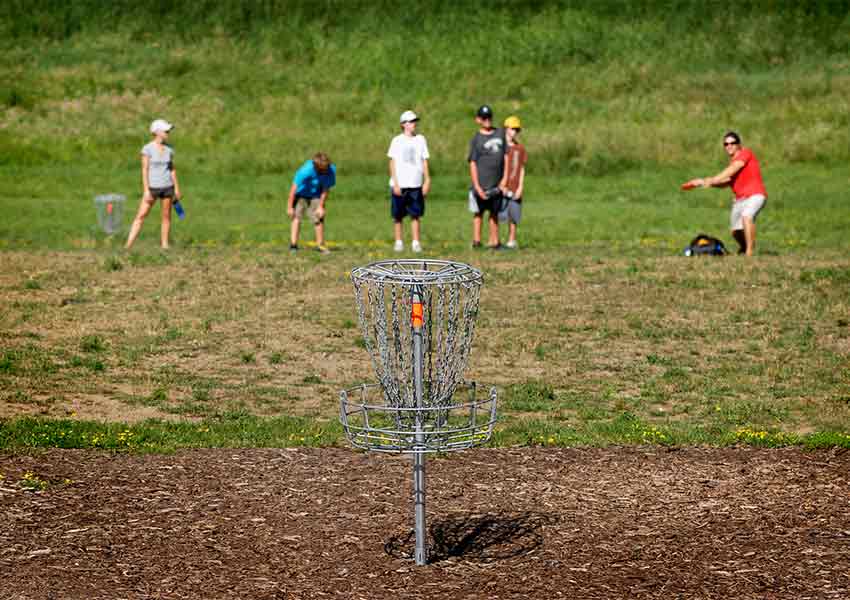
Disc golf has been around since the mid-1970s and had its origins in Southern California. The game of disc golf is similar to golf in scoring, but instead of using clubs and a ball, you use a disc.
The objective is to throw the disc into a basket using the fewest number of throws as possible. That’s it! Simple. The challenge is getting the disc to go where you want it to go.
In this post, we’ll cover the difference between discs and Frisbees, how to throw basic putts and how to throw for distance so you can get out and enjoy disc golf for yourself.
Discs vs. Frisbees
Discs are different than Frisbees used for playing catch. Discs are generally smaller than Frisbees, averaging 8-9 inches in diameter. They are also often made of harder plastic and can have quite sharp beveled (slanted) edges. It is the bevel of the edge that determines the function of the disc.
A sharp, beveled edge on a disc is for distance throws; a curved, but not as sharp, beveled edge is used for mid-range throws, and a putter generally has a more rounded bevel.
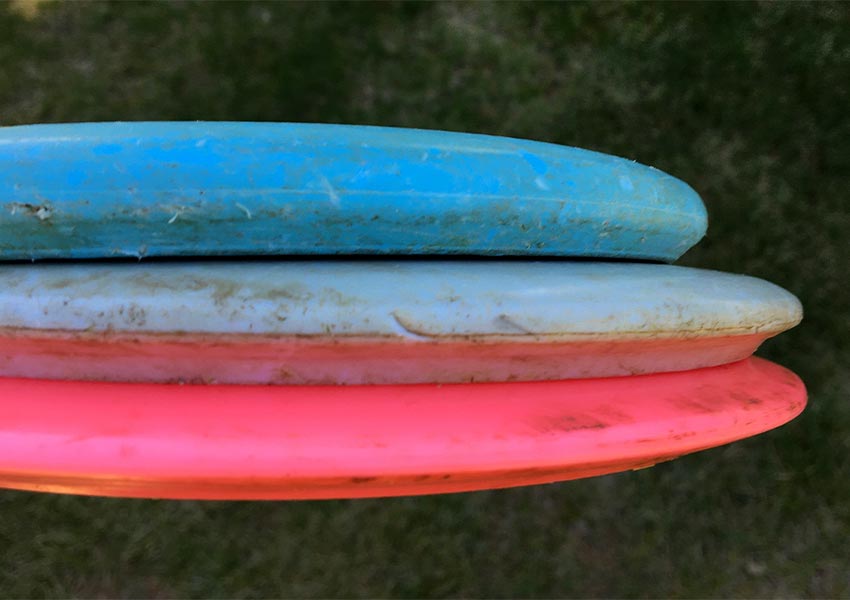
People who get into disc golf can go nuts buying different discs that are designed to behave differently in the air when thrown with a certain amount of power — not unlike people who are into playing golf have their specialized golf clubs.
But to play disc golf, you don’t need any special discs. In fact, you only really need to have one disc. If you go with one disc, I suggest finding a midrange disc which is the most versatile.
Throwing a Basic Putt
Learning how to putt, or throw short shots, is one of the best places to start in disc golf. This way you can dial in the form before adding power.
The instructions for throwing a disc, as written on the original Pluto Platter Frisbee in 1955, said “a flat flip flies straight.” That means when you release the disc with a flick of the wrist and the disc is parallel to the ground, it has the best chance of flying straight. Imagine throwing a pizza flat so none of the toppings slide off.
Of course, that’s easier said than done. It takes practice, patience and perseverance to flick the disc flat.
Common Types of Putts
Putting is done within roughly 15 feet of the basket. You can throw the disc any way you like to get it into the basket, though there are three common putts to try: the backhand toss, the wheel throw and the free throw.
Disc golfers often interchange these depending on distance, wind and personal preference.
How to Throw a Backhand Toss
- Place your thumb on top of the disc, your index finger on the edge to guide the disc, and your other fingers underneath the disc.
- Stand facing the basket. If you are right-handed, put your right foot forward towards the basket, and your left foot stepped back.
- Bring your disc back towards your body and then forward in a smooth motion, releasing it with a flick of the wrist towards the basket, being sure to point at the basket when done with the throw.
Benefit of this toss: It’s comfortable – most people are used to doing this throw, so it’s familiar.
Challenge to this toss: It’s harder to control throwing the disc straight.
How to Wheel Throw
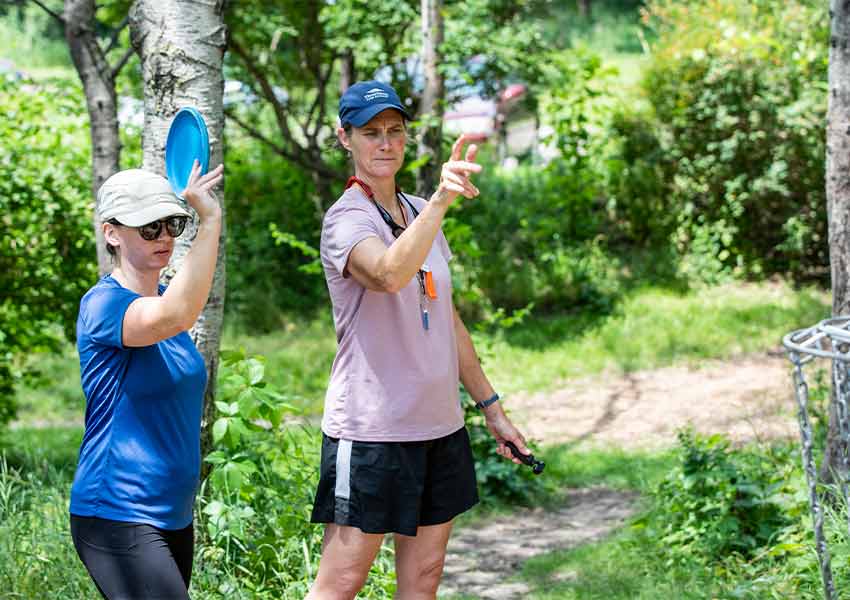
- Face target. Hold disc upright with thumb on top and first and second fingers underneath, pushing against leading edge of disc.
- Toss the disc underhand or overhand towards basket.
Benefit of this toss: It’s easier to throw the wheel (or disc) straight.
Challenge of this toss: The basket chains are less likely to “catch” the disc, so it sometimes rolls right out of the basket, and it’s not a good throw on windy days as the disc will get caught by the wind and not fly straight.
How to Free Throw
- Face the basket. Hold the disc with thumb and pinky pressed up against the inside edge of the disc and fingers curled over top of disc (like holding a basketball for a free throw).
- Hold disc up in front of forehead (like a free throw, with elbow lined up under wrist).
- Flick wrist forward in a waving motion. Disc will rotate through the air, like a basketball rotates upon release.
Benefit of this throw: It’s easier to throw straight.
Challenge of this throw: It’s not good for longer distances; it’s a close range putt.
Throwing Discs for Distance
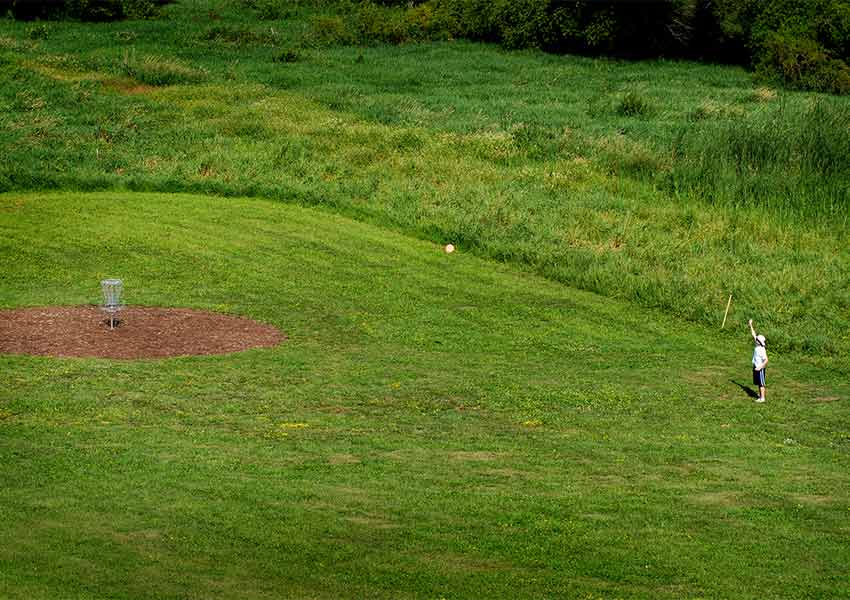
Putting happens when you are close to the basket, but each hole starts with teeing off from a distance.
There are two primary distance throws people use: the backhand throw and the forehand throw. Most people initially learn the backhand throw when they learn to throw a Frisbee, but the forehand throw is a great throw to try because I have found that many people are just naturally good at it.
If you find you like disc golf, it’s good to learn to throw both forehand and backhand because you can use both throws depending on where your disc lies from the tee or whether it’s behind an obstacle. The backhand throw tends to fade left at the end of the throw and the forehand throw fades right. It can be very helpful to have both throws in the repertoire.
How to Throw Backhand
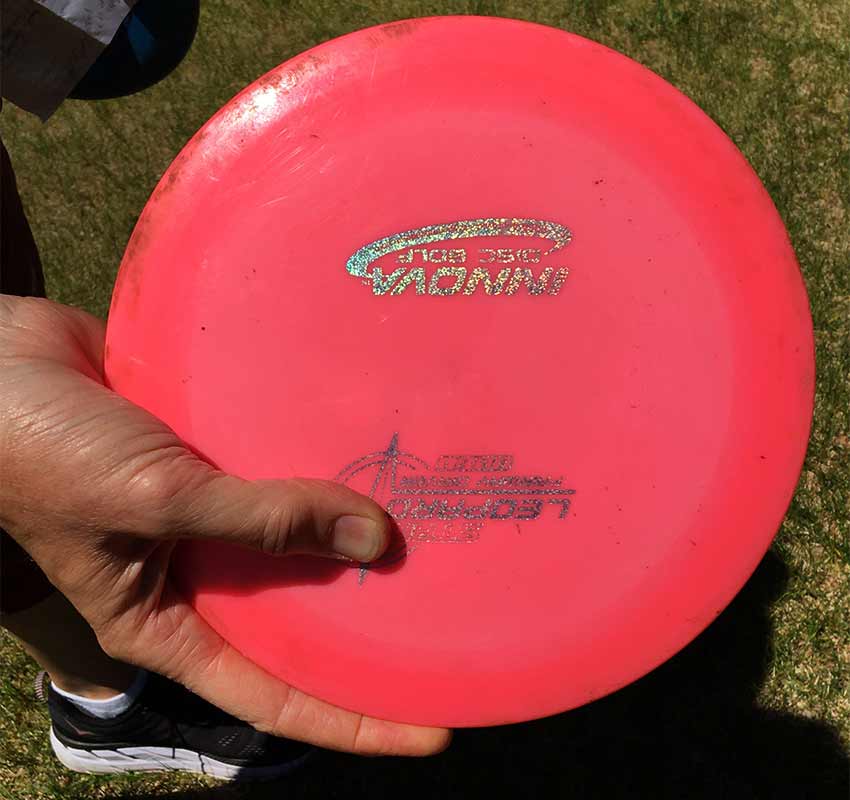
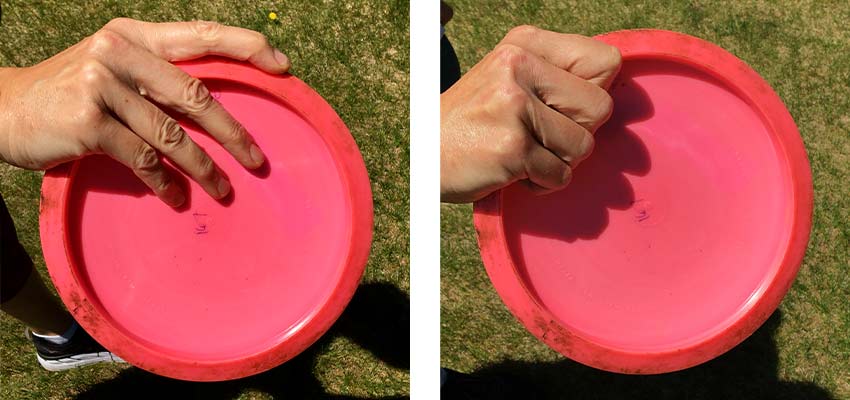
- Slip the edge of the disc into the space between your thumb and index finger. Your thumb should be on top and place all your fingers underneath, grasping the edge of the disc for a firm, but not-too-tight, grip.
- Stand sideways with your throwing side towards the target.
- Bend your elbow and extend behind you. Flex your knees, squat down two inches or so and prepare to throw using your hips, arm and wrist.
- Starting with your arm by your opposite shoulder, pull your disc across your body keeping it close to your body, like you are drawing a line from your shoulder straight out towards the target, giving the disc an extra snap with your wrist as you release.
- As your arm is coming across your body, let your hips rotate with your arm, like your belly button is connected to the disc by an invisible rod.
- After you release the disc, follow through by letting your body and arm continue their momentum.
How to Throw Forehand
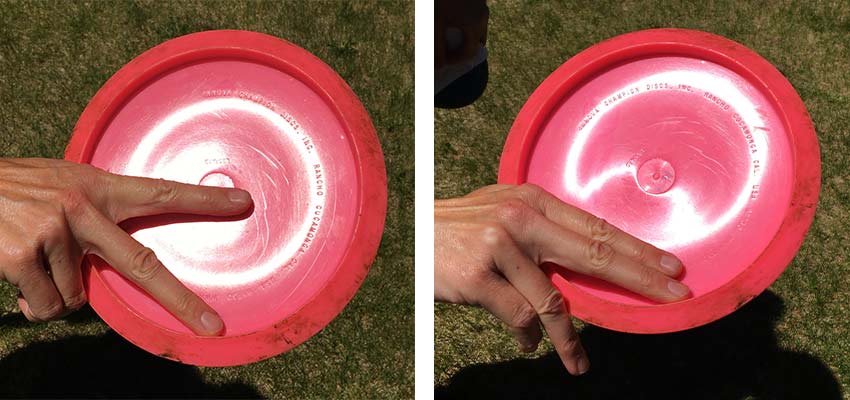
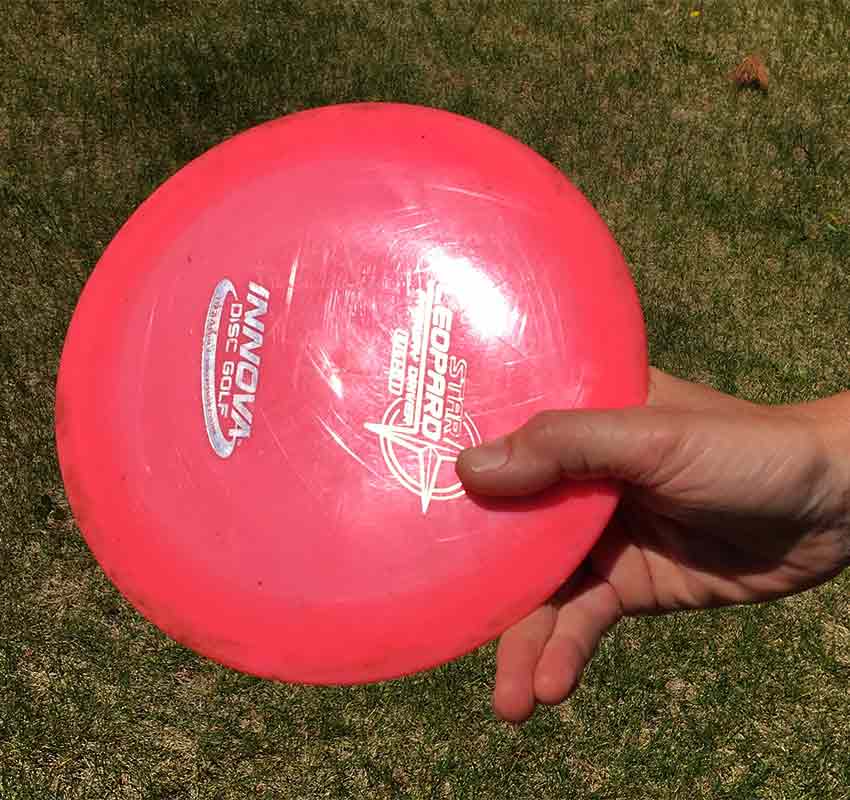
- Make a peace sign with your index and middle finger, making sure your palm is facing the sky. Grip the disc with the peace sign on the bottom with your pointer finger in the middle of the disc, and your middle finger pushed up against the edge of the disc (this is the finger that will “push” the disc forward).
Note: Pushing both pointer and middle finger together for a “power couple” grip will allow for a stronger throw (good for distance); maintaining the peace sign grip will result in less power, but a more stable throw (good for putting). - Stand facing your target. Step with your opposite foot towards the target, like throwing a ball.
- Hold the disc up behind your throwing shoulder, like if you were holding a pizza on your hand. Remember: You want to hold the pizza flat, so you don’t let all the toppings slide off.
- Dip your throwing shoulder and throw, slightly leading with your elbow, following through with disc and a flick at the end, ending with your fingers pointing towards the target.
Disc Golf in Three Rivers
Now you are all set to play! Find a friend, head out to a disc golf course and enjoy flicking a disc.
Three Rivers Park District has three beautiful disc golf courses open spring through fall at Bryant Lake Regional Park, Elm Creek Park Reserve and Hyland Hills Ski Area. But I’d have to say the 18-hole course at Bryant Lake is my particular favorite with its incredible landscaping, views of the lake, and technical holes.
All three courses are pay-to-play courses. You can purchase a day pass or an annual pass online. There are many free disc golf courses in communities all around the Twin Cities, too.
At this time, disc rentals are not be available. To reduce touching shared surfaces, scorecards will not be available. UDisc is a free app for Android & iPhone that is available for keeping score.
Some Friendly Reminders
- Practice social distancing. Please keep six feet between yourself and others.
- Refrain from gathering near entrances, tees or picnic tables.
- Please refrain from retrieving or touching other players' discs.
- Limit contact with course equipment. Consider discs thrown six feet or closer to the basket a "gimmie
Remember to be gentle with yourself, don’t take the game too seriously and bask in the beauty of the outdoors.
About the Author

Formerly a teacher with 18 years of classroom experience, Ann has been sharing her love of the outdoors with people in one capacity or another all her life. Ann’s outdoor recreation experience includes running an outdoor adventure company in the mountains of Southern California, backpacking in California, Oregon, Washington and Colorado, canoe and Voyageur canoe guiding in Northern Wisconsin, numerous BWCA trips with friends, and working with the Outdoor Recreation School of Three Rivers Parks for the past 10 years. Ann has a particular love for disc golf having grown up playing Frisbee in Southern California.
Related Blog Posts
More Quiet(er) Parks to Explore
By: Erin Korsmo Andrea Breitung
We're back with another list of our favorite parks for a quieter walk. Read on to find your next place to spread out and explore.
My Year of 52 Hikes — And 5 Reasons to Join Me in 2020
By: Andrea Breitung
Could you complete 52 hikes in one year? That's what one Three Rivers employee set out to do in 2019. Learn about her experience taking on the 52 Hike Challenge and why you might want to try it for yourself in 2020.
Best Places to Paddle in Three Rivers
By: Alyssa Schauer
The heat of summer is here, and sometimes a peaceful paddle is just what you need to cool off. See our favorite places to paddle in Three Rivers, then hit the water and find yours!


